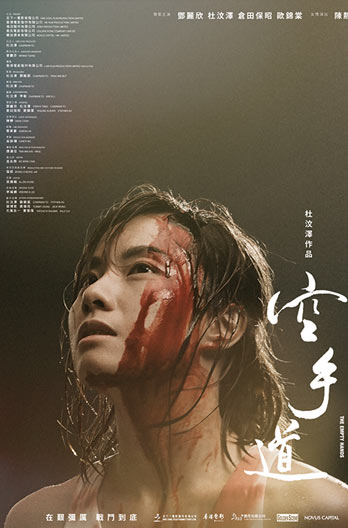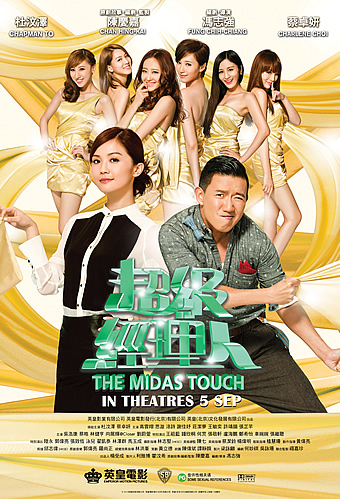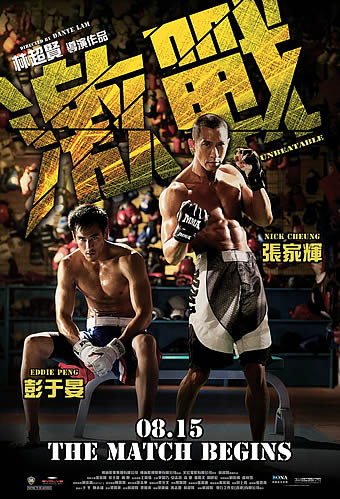THE EMPTY HANDS (空手道) (2017) [SCFF 2018]
Genre: Drama
Director: Chapman To
Cast: Stephy Tang, Chapman To, Yasuaki Kurata, Stephen Au, Dada Chan
Runtime: 1 hr 30 mins
Rating: M18 (Sexual Scenes)
Screening Dates: 4 & 5 May 2018 (visit scff.sg/films/the-empty-hands/ for showtimes)
Synopsis: Half-Chinese and half-Japanese Mari Hirakawa is the daughter of a Karate coach. Since her childhood, she was forced under her father’s training, and has resented Karate for as long as she can remember–her only wish is to sell the dojo after her father passes away. Following his death, Mari starts fantasizing about her life of freedom; however, she finds out from her lawyer that her father has only left her 49% ownership of the property, the other 51% was left to one of his worst pupils, Chan Keung. The two clash, and Chan has a proposition–if Mari is able to win a match in a legitimate martial arts competition, he will unconditionally give her his share of the property. Mari is trapped in a dilemma, and will have to make a choice that will change her life. Prolific comedienne actor Chapman To makes a stunning transition to film directing and is recognized by film critics as well as the Hong Kong Film Awards for his craft behind the camera and guiding the breakthrough performance of his leading actress Stephy Tang.
Movie Review:
Once one of Hong Kong’s most promising comedians, Chapman To had in recent years been shunned by many of its producers and directors – including his frequent collaborator Wong Jing – for his controversial comments on the mainland government in the wake of the Sunflower Student Movement in Taiwan and the Umbrella Movement in his homeland. In fact, To’s last cinematic effort was the Singapore-Malaysia Chinese New Year co-production ‘Let’s Eat!’ two years ago, which also saw the star make his first foray into directing. That his sophomore feature film has taken this long is as a result of two factors – one, his own physical transformation, earning a black belt in karate along the way; and two, the time he has taken to nurture his pet project, which he produced and co-wrote with Erica Li.
To also co-stars in the drama as a former triad member Chan Kent who has just been released from prison, although he seems perfectly happy to let his character play second fiddle to Stephy Tang’s Mari Harikawa. ‘The Empty Hands’ is really a coming-of-age story of the half-Chinese, half-Japanese daughter of a karate master, who up till her father’s (Yasuaki Kurata) death, had resented him for forcing her into learning karate at a young age. In truth, she had only started to hate the sport after losing a competition when she was a teenager. That defeat had crushed her in more ways than one, and she now gets by in dead-end jobs while throwing herself into an affair with a married radio DJ Calvin (former news anchor Ryan Lau). Assuming that she would inherit the flat he had converted partially into a dojo, Mari wants only to sub-divide it into seven smaller rooms and get by with the rent she can therefore collect.
Unfortunately, Mari discovers that her father had only bequeathed 49 per cent of the property to her, with the rest going to Chan, who had been her father’s former pupil. With help from her father’s faithful assistant Mute Dog (Stephen Au), Chan reopens the dojo and starts giving lessons to a couple of young boys. Her frustration at being denied the chance to break free of her father’s shackles, coupled with her boyfriend’s neglect, leads Mari to fly into a rage one day, though she is quickly put into her place by the students as well as Chan. The latter lays down a challenge: if she can enter a fighting competition and remain standing at the end of it, he will transfer his share of the flat to her, so that she can do with it as she pleases. Cue the obligatory training montages and the eventual underdog triumph, which to her credit, Tang executes with utter conviction and credibility.
Oh yes, Tang is truly mesmerising here – not only does she make her character with all its flaws relatable and sympathetic, she handles Mari’s subsequent transformation with nuance, grace and restraint. Tang has said that she had put in six months of karate training into the role, and it shows in how the flexibility and fluidity of her moves onscreen. For someone whose claim to fame was countless Patrick Kong romances with her ex-beau Alex Fong, Tang makes a convincing leap into serious dramatic territory here, reinventing herself without doubt as a serious actress. Like we said earlier, To is all too willing to let Tang be in the limelight, and his trust in Tang to take the film to greater heights is certainly not misplaced.
On his part, To focuses on sculpting a meditative film about redemption and reconciliation, emphasising the importance of personal discipline through the intersection of karate and life itself. His love and reverence for the sport is evident throughout the film, which boasts more than a few memorable impressionistic shots of Tang, To and Kurata in practice. Where To falters is in the narrative itself, which while clearly intended as a character study on Mari, leaves a lot of subplots hanging – for one, besides a montage detailing Chan’s backstory, there is little else about Chan that comes into focus; for another, Mari’s relationship woes are left hanging; and for yet another, other supporting characters like Dada Chan’s busty masseur and Au’s Mute Dog are hardly given much by way of a character arc.
But that hardly means that ‘The Empty Hands’ comes up empty; on the contrary, it is absorbing in its own offbeat way, peppered with some welcome moments of levity by To himself. It is undeniably commendable that To has eschewed commercial sensibility in favour of a more intimate, artistic and even eccentric sports drama, and we’re certainly piqued by what he does next in his filmmaking career. Likewise for Tang, whose breakout performance here is the heart and soul of the movie. Don’t go in expecting the sort of payoff like Nick Cheung’s ‘Unbeatable’; instead, think of how you would clear your mind, calm your thoughts and deliberate your every motion as you would in karate, and that’s about how you’d enjoy this deliberately paced but wholly engrossing film.
Movie Rating:




(Bolstered by a stunning career-best performance by Stephy Tang, Chapman To's meditative coming-of-age drama is a moving story of redemption and reconcilation)
Review by Gabriel Chong
You might also like:





